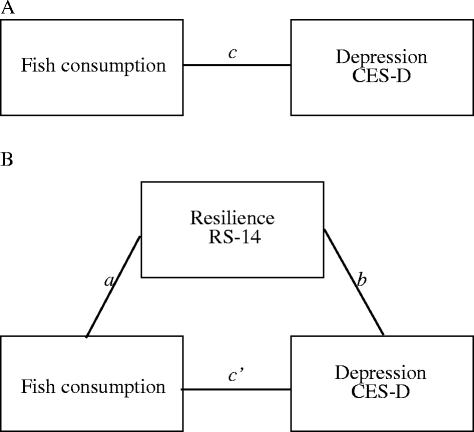Fish consumption and resilience to depression in Japanese company workers: a cross-sectional study
- PMID: 26007632
- PMCID: PMC4447023
- DOI: 10.1186/s12944-015-0048-8
Fish consumption and resilience to depression in Japanese company workers: a cross-sectional study
Abstract
Background: Depression is a common disorder that is influenced by psychosocial factors in the workplace. Increasing resilience, the ability to cope with stress in the face of adversity, is considered an important strategy to prevent depression. It has been suggested that consumption of fish, which is a major source of long chain n-3 polyunsaturated fatty acids (LC n-3 PUFA), may prevent depression. However, associations between depression, resilience, and fish consumption have not been documented. The aim of the study is to investigate the association between fish consumption and resilience to depression.
Methods: Participants were 527 Japanese employees at three worksites of a large company. The Center for Epidemiologic Studies Depression (CES-D) Scale was administered to assess depressive symptoms, and the 14-item Resilience Scale (RS-14) was administered to assess resilience. A self-report questionnaire extracted from the Food Frequency Questionnaire was used to measure fish consumption frequency. Regression analyses were conducted to assess a mediation model based on a statistical analysis framework defined by Baron and Kenny. The indirect association of resilience was calculated with the bootstrapping method. Each analysis was adjusted by age, sex, marital status, work position, and educational background.
Results: The association between fish consumption frequency and total CES-D score was significant (B=-0.94; p=0.011). The association between fish consumption frequency and total RS-14 score was significant (B=1.4; p=0.010), as was association total RS-14 score and the total CES-D score (B=-0.34; p<0.001). When controlling for total RS-14 score, there was no longer a significant association between fish consumption frequency and total CES-D score. The bootstrapping results revealed that significant indirect association though fish consumption frequency and total CES-D score (bias corrected and accelerated confidence interval=-0.83 to -0.13; 95% confidence interval) through total RS-14 score.
Conclusions: Fish consumption might be associated with resilience to depression. Further studies are needed, particularly double blind randomized placebo controlled intervention trials on the potential preventative effect of LC n-3 PUFA on resilience to depression.
Figures

References
-
- Bültmann U, Rugulies R, Lund T, Christensen KB, Labriola M, Burr H. Depressive symptoms and the risk of long-term sickness absence: a prospective study among 4747 employees in Denmark. Soc Psychiatry Psychiatr Epidemiol. 2006;41:875–80. - PubMed
-
- Mykletun A, Overland S, Dahl AA, Krokstad S, Bjerkeset O, Glozier N, Aarø LE, Prince M. A population-based cohort study of the effect of common mental disorders on disability pension awards. Am J Psychiatry. 2006;163:1412–8. - PubMed
-
- Luppa M, Heinrich S, Angermeyer MC, König H-H, Riedel-Heller SG. Cost-of-illness studies of depression: a systematic review. J Affect Disord. 2007;98:29–43. - PubMed
Publication types
MeSH terms
LinkOut - more resources
Full Text Sources
Other Literature Sources
Medical

